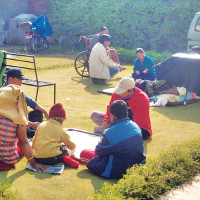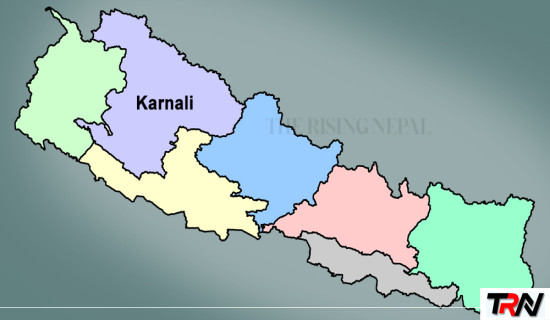- Sunday, 15 June 2025
A legend of folk song Haridevi Koirala
By Govinda Marasini Haridevi Koirala, an affluent figure in Nepali folk music, embarked on her formal musical journey for the first time with the song ‘Paina Khabara’ in 1985.
When Koirala created this song, she never anticipated becoming a singer.
However, the song led her to fame, establishing Koirala as a noted figure in folk music.
Born in Baidam, Kaski, in 1959, Koirala was drawn to music from an early age.
Born in a big family with five brothers, her house once consisted of around 40 members. She had responsibilities to look after, play with, and have fun with her brothers and sisters.
She completed her SLC from Barahi Secondary School in Pokhara.
Haridevi's exposure to the musical atmosphere in Baidam, where farmers sang while threshing corn, paddy, and millet, influenced her deeply.
At a young age, she began writing and reciting songs and poems. The folk tunes and sarangi performances of 'Gandharvas' at home further fueled her musical passions.
Koirala stated that she received immense support for her musical journey from her husband, Ram Bahadur Koirala.
She came to Kathmandu to record songs at Radio Nepal.
With the help of the artist Prem Raja Mahat, she managed to record a song in an ordinary studio.
After recording the song, she returned to her village, where it was decided that the cassette should only be released if her voice sounded good.
Two months later, she knew that the record had been released, and by then, discussions about the song were already ongoing. She had not anticipated the song's popularity.
Talking about her perspective on folk songs, she said that the simplicity and relatability of folk songs can deeply impact the public.
However, she expresses concern about the current state of many songs, noting a loss of the distinct rhythm, thematic richness, original fragrance, and precision in traditional songs.
She expresses concern that if the current trend continues, the younger generation may lose touch with the cultural and identity aspects of Nepali folk songs, putting them at risk of disappearing.
She said, “Folk songs are Nepal's indigenous music, let's study and not forget them. Folk music is the mother of music, and if its roots are disturbed, it will vanish.”
Her musical repertoire covers a wide range of themes, including the pain of mothers, the joy of sisters, the struggles of marriage, stories of trafficked girls, the anguish of fathers, reflections on going abroad, human rights and the dowry system.
In addition to folk songs, she has ventured into Ratayuli songs, hymns and cultural songs.
Some of her notable compositions include 'Paina Khabara,' 'Chautarima Barko Chhaya Chaa,' 'Hitko Maya,' 'Peepalko Chhayale,' 'Phulko Dalima,' 'Aadhinkhola Syangja Bazar,' 'Choli Vijyo Ashunle,' 'Laali Jowan Kalile,' and more.
Koirala has penned and created over a thousand songs.
She particularly enjoys the storytelling aspect in her songs and believes they resonate with the rural, portraying the happiness, sadness, and empathy found in village life.
Rich in melodious voice and poignant lyrics, Koirala has remained steadfast in her dedication to art, literature, and music, staying loyal to her country and people.
Beyond her musical contributions, she has actively participated in various social sectors and excels in collecting and publishing old songs.
Now at 63, Koirala has 10 collections of songs, poems, and child songs to her credit.
Currently, she is engaged in remaking her old songs, with a recent release of a new video for her first song, 'Paina Khabar,' and plans to release 21 remade songs gradually.
(Marasini is a freelance journalist)

















